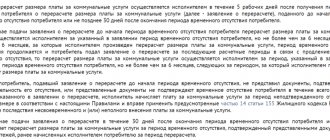Services and work for the maintenance and repair of the common property of an apartment building, paid by citizens as part of the fee for the maintenance and repair of residential premises , do not include :
a)
maintenance and repair of doors
to apartments, doors and windows located inside residential or non-residential premises that are not public premises;
b) insulation of window and balcony openings
, replacement of broken glass windows and balcony doors, insulation of entrance doors in apartments and non-residential premises that are not common areas;
c) cleaning and cleaning of land plots
that
are not part of the local area - common property , as well as their landscaping and care of landscaping elements (including lawns, flower beds, trees and shrubs).
In addition, other services may include services that ensure the safety of citizens
in the house, including the installation and operation of locking entrance devices, CCTV cameras, maintenance of shift services and entrance attendants.
Other services that may be provided to citizens - owners and tenants of premises in apartment buildings may include household services
:
• reconstruction of individual antennas and collective reception systems; • technical maintenance of collective television reception systems; • repair of the collective television reception system; • repair of elements of distribution networks of collective television reception systems; • repair of individual antennas; • repair of antenna equipment for individual use (amplifiers, converters, etc.; • replacement of the reduction cable of an individual antenna; • measurement of the level of the television signal at the reception location; • repair of electric bells; • repair of electric meters; • conversion of electric meters from one voltage to another; • production and repair of electric water heaters; • repair of home heating boilers; • repair of wooden cornices; • comprehensive (partial) repair of houses and apartments at the request of the population; • repair of all types of floors; • strengthening of door frames; • change of mortise and rim locks, hardware; • equipment built-in wardrobes and mezzanines; • production of carpentry building parts and products; • production of reinforced concrete building parts and products; • cladding and insulation of doors, insertion of inspection eyes; • development of design estimates for the construction and reconstruction of residential and non-residential buildings; • consultation with a specialist on repair and construction work; • installation of a radio station for multi-program wire broadcasting over national local telephone networks; • use of individual radio points; • replacing the socket with a new type of socket; • installation, rearrangement and reconnection of the radio point to the radio broadcast network; • replacement of radio wiring; • troubleshooting a radio broadcast.
In order to ensure favorable living conditions in an apartment building, in addition to mandatory work, owners can instruct the management organization to provide them with services other than services for the proper maintenance of common property in an apartment building, i.e. other services
. Such services (work) are provided in premises that are not the common property of an apartment building, for example, apartments, rooms, loggias, balconies, land plots.
Other services listed above in an apartment building may include:
— communication services in terms of providing citizens with wired radio and television services; — services for installing security alarms, home security (including private security services); — services for preferential insurance of residential premises and general property of an apartment building.
Other services must be paid (additionally) by the owners or users of premises in an apartment building who use these services, simultaneously with payment for the maintenance and repair of residential premises (common property of an apartment building) and utilities in accordance with the agreements concluded by such persons for their provision (or a management agreement apartment building, or with organizations providing them).
In the case of organizing settlements for the population and legal entities through the GKU IS system or the State Budgetary Institution of the MFC of the districts, payments for these other services are included in the monthly single payment document (UPD) generated for individuals.
Other services are provided either to all owners and users of premises in an apartment building, or to a portion of the owners. In the case of the provision of services to a separate part of the owners and users of these services, persons who do not want to use such services have the right to refuse payment for them in accordance with the established procedure. For example, do not pay:
— preferential insurance of residential premises by not including this payment in the total amount of paid services and work under the EPD using a mark in specially designated fields (places) of this document; - wired radio broadcasting (television) services in the manner established by the Moscow city radio broadcasting (television) service, which involves a written request from the owner or user of the premises in an apartment building with a statement of reluctance to use these services and disconnecting this premises from wired radio broadcasting or cable television networks.
How to force the MFC to remove unnecessary services from housing and communal services payments
Since the beginning of the year, many have seen numerous “surprises” in their utility bills - services that you have never ordered or used. And even if they had previously officially refused. For example, some people have a “Radio Point” again, others have a “Locking Device”. I got an "Antenna".
The State Budgetary Institution of the MFC, which issues payments to us, immediately told me: go to Rostelecom and sort them out. It turned out that Rostelecom sent letters to the MFC “with a list of persons who unauthorizedly connected to the antenna.” Like, we conducted an investigation, and here they are, the scoundrels. This, of course, was a complete lie: there was no investigation. Our shield is locked with a key, and access to it is also through a closed door. Neighbors said that no one was allowed in.
That is, Rostelecom just wanted money, they created this fake letter and... MFC included this in our payments! During a personal visit, they refused to delete this line: they say, we have nothing to do with it. Also a lie: they issue invoices, they are obliged to turn it off. I wrote a short one-page complaint:
I, as the owner of the apartment, did not submit any applications to the management company, the State Budgetary Institution MFC or Rostelecom for connecting the antenna and the agreed collection of fees for antenna maintenance, and did not apply for such a service. In this regard, actions are considered to violate my rights as a user of housing and communal services.
The copy of the claim at the branch of the State Budgetary Institution MFC was stamped with an acceptance stamp.
A couple of weeks later the same answer came: we forwarded your letter to Rostelecom, we have nothing to do with it. I already wanted to file a lawsuit, but... the next day they sent me adjusted bills, which no longer included the “Antenna”. This is how we live: it seems like I was sent everywhere, but in the end the law was fulfilled. And everything is very simple: they cannot officially recognize the illegality of this payment. Because actually this is pure crime, fraud. The expectation is that you will pay for an illegal service for several months, personally go to the Rostelecom office, write a statement about disconnection, and then wait and pay for another 30 days. In the same way, I think, you can get rid of other imposed services that you did not ask for.
I talk about this in more detail in my video:
VAT – 2022
The best speaker on tax topics, , will prepare you for filing your return on January 14 . There are 10 out of 40 places left for the online workshop . The flow is limited, as there will be live communication with the teacher live. Hurry up to get into the group. Sign up>>>
How is the amount of water calculated?
Charges for the supply of hot water are calculated based on the amount of liquid consumed. The volume of hot water consumed during the reporting period is determined by an individual meter. When entering reporting data, it is necessary to take into account the black meter numbers.
They indicate the volume of water consumption in cubic meters. The red numbers are the amount of liquid in liters up to 1 m3. They are used to monitor the consumption of domestic hot water by persons living in the premises and are not reporting data. The period of time during which hot water supply consumption is measured is determined by regulatory documents.
The reporting period is one calendar month. Payment is made for the difference in readings between a certain date of the last month and the present. In the absence of an individual metering device, the consumption of actually consumed heat and hot water is calculated according to the standard, depending on the number of people living in the room.
The amount of liquid consumed by one person living in an apartment during the day, according to SNiP, is:
- Residential premises with existing water supply and sewerage - 120 liters per day per person.
- Similar residential premises with gas supply - 150 liters per day.
- Premises with existing water supply, sewerage, bathroom and solid fuel water heater - 180 liters per day.
- Similar houses or apartments with water heaters, the energy carrier of which is gas - 225 l.
- The same rooms with high-speed gas boilers - 250 l.
- Apartments with centralized hot water supply - 230 liters per person.
Thus, the payment for hot water supply is calculated based on the liquid consumption for the needs of one person, in accordance with established standards. As a rule, the standard according to SNiP exceeds the actual water consumption.
This makes installing a meter profitable and allows you to save money. The replacement of the meter is carried out by authorized persons of the relevant organizations.
The meaning of the abbreviations HVS and DHW, conditions for setting tariffs
Cold water supply and hot water supply stand for cold and hot water supply, respectively. In accordance with legal requirements, the assignment of current tariffs is approved by resolutions of local authorities in the regions, taking into account the following factors:
- presence of water sources;
- distances of water intake points to consumption facilities;
- water volumes;
- suitability of water resources for drinking purposes and costs of necessary treatment.
Although regions are allowed to set their own tariffs, there are federal restrictions that cannot be exceeded.
The consumer can learn more about the size of the established tariffs in the regions by contacting the official portal of local authorities or the energy supplier.
Cost calculation
When calculating the cost of one cubic meter, the costs spent by the resource supplier for the following needs are taken into account:
- electricity payments;
- purchases of cleaning materials and components;
- research of water quality characteristics in laboratory conditions;
- payroll fund for the involved personnel and tax deductions;
- rental of equipment and other property;
- maintenance and repair of water pipeline networks, treatment facilities and other infrastructure facilities;
- carrying out environmental activities, document flow, etc.
We recommend: How much electricity do different types of light bulbs consume?
All positions are calculated based on the standards established by law.
In the presence and absence of individual metering devices
Tariffs for consumers with and without installed meters are the same. The difference lies in the counting system. Owners with registered metering devices pay according to their readings, for the amount of resources actually used. It is determined how much water the consumer consumed during the month, then the result is multiplied by the established price.
Additionally, expenses for general house needs are payable, calculated based on the difference in the readings of individual and household metering devices.
For consumers who do not use meters, payment is made according to approved standards, taking into account the monthly volume of water based on one resident registered in the apartment.
To encourage citizens to install meters, increasing coefficients are applied, legally limited to 1.5. Therefore, the amount to be paid, calculated according to the standards, will always be higher than the actually spent resources determined by the meter.
Features of DHW tariffication
Unlike cold water, the tariff for hot water supply consists of two parts:
- payment of the cost of cold water;
- the cost of heating it to the established temperature conditions ranging from 50 to 65 degrees above zero.
We recommend: Who is exempt from contributions for major repairs of an apartment building
Many utilities similarly divide the amount of payment for hot water in the submitted invoices in two, separately highlighting hot water and the cost of heating cold water.
This methodology is recommended by state legislative norms and allows you to reflect in detail the distribution of costs for the provision of these services. Considering that cold water is supplied by the water utility, and its heating is carried out by another organization, costs must also be divided for subsequent transfer to suppliers.
Resources provided must be paid for appropriately. But if suppliers do not fulfill their obligations with the required level of quality, the consumer has the right to defend his own interests in court, attaching documentary evidence of the legitimacy of the claims made.







